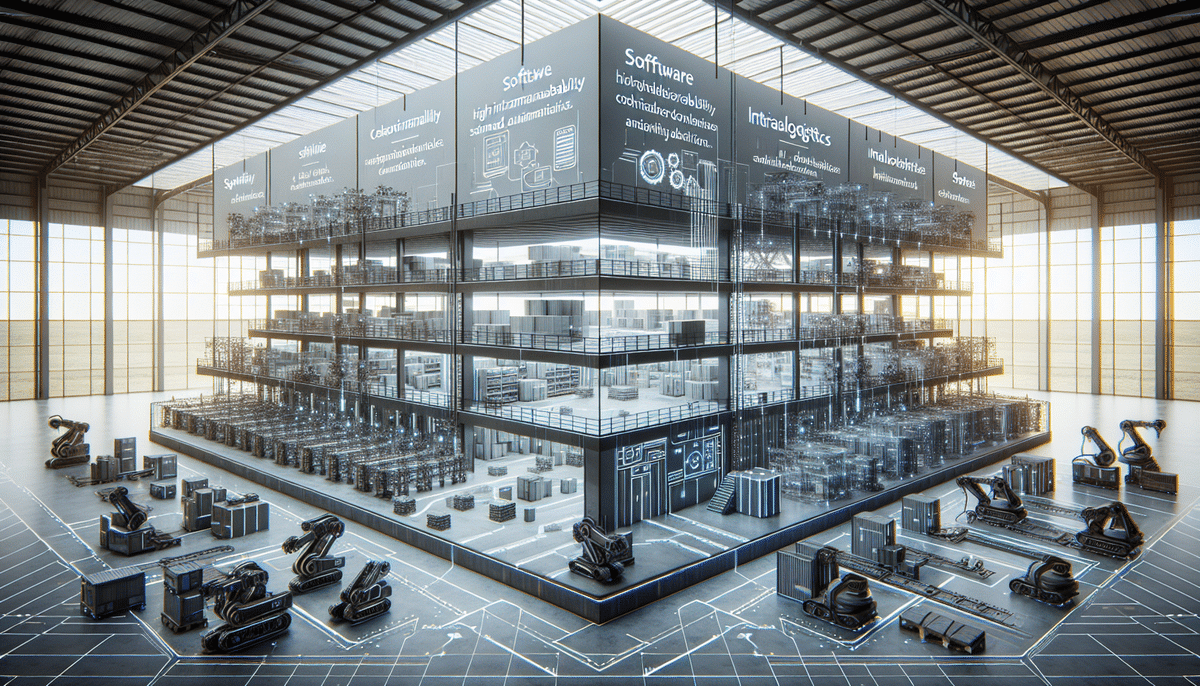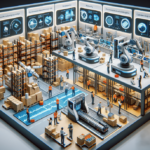Swisslog vs AutoStore: A Comprehensive Comparison
In the realm of warehouse automation, Swisslog and AutoStore stand out as leading solutions. Both technologies aim to enhance efficiency and productivity in warehouse operations, but they cater to different business needs and scales. This article delves into their distinctive features, advantages, and limitations to help businesses make informed decisions about their warehouse automation strategies.
Technological Features and Capabilities
Swisslog and AutoStore employ advanced technologies to optimize warehouse management, yet their approaches differ significantly:
- AutoStore utilizes a grid-based system of totes and robots that autonomously retrieve and store items, allowing for high-density storage and quick item retrieval.
- Swisslog offers a more integrated solution, combining automated storage and retrieval systems (AS/RS), conveyor systems, and autonomous mobile robots (AMRs) to manage the flow of goods throughout the warehouse.
Scalability and Flexibility
Both systems are scalable, but they serve different scales and flexibility requirements:
- AutoStore is highly modular, enabling businesses to expand their automation gradually as their needs grow. This makes it ideal for businesses anticipating growth or seasonal fluctuations.
- Swisslog is better suited for large-scale operations with consistent high-volume requirements, offering comprehensive automation that minimizes manual intervention.
Pros and Cons of Swisslog and AutoStore
Swisslog
- Pros:
- High storage capacity and efficient space utilization.
- Advanced integration with existing warehouse management systems.
- Robust automation capabilities, including transport and retrieval.
- Cons:
- Higher initial investment and implementation costs.
- Requires significant maintenance and technical support.
- Less flexible for smaller or rapidly changing inventories.
AutoStore
- Pros:
- Cost-effective with lower initial setup expenses.
- Highly scalable and flexible, suitable for various warehouse sizes.
- Quick implementation and easier maintenance.
- Cons:
- Limited storage capacity compared to comprehensive systems like Swisslog.
- May require additional systems for complete warehouse automation.
Cost-Effectiveness and ROI
When evaluating the cost-effectiveness of Swisslog and AutoStore, it's essential to consider both initial investments and long-term returns:
- Swisslog involves higher upfront costs due to its extensive automation features and integration capabilities. However, businesses can achieve significant long-term savings through increased efficiency and reduced labor costs.
- AutoStore offers a more affordable entry point, allowing businesses to start small and scale as needed. This modular approach can lead to a quicker return on investment, especially for businesses with fluctuating inventory levels.
According to a McKinsey report, warehouse automation can reduce operational costs by up to 50% while increasing productivity by 30%.
Efficiency and Order Fulfillment
Both Swisslog and AutoStore enhance warehouse efficiency, but their impact varies based on the scale and nature of operations:
- Swisslog excels in large warehouses handling high-volume and complex orders, thanks to its integrated systems that ensure rapid and accurate order fulfillment.
- AutoStore is ideal for businesses with high-turnover inventory and diverse product ranges. Its compact design facilitates quick item retrieval, reducing order processing times.
Studies indicate that implementing warehouse automation can increase order fulfillment speed by up to 25%, as reported by the Supply Chain Digital.
Implementation and Case Studies
Real-world implementations of Swisslog and AutoStore demonstrate their effectiveness in various operational contexts:
- Swisslog:
- Amazon utilizes Swisslog systems in its fulfillment centers to streamline operations and manage vast inventories efficiently.
- DHL has integrated Swisslog's AS/RS to enhance its logistics and distribution capabilities.
- AutoStore:
- Zalando, a leading e-commerce platform, employs AutoStore systems to manage its extensive product catalog and ensure swift order processing.
- The North Face uses AutoStore to optimize its warehouse operations, reducing order fulfillment times and improving inventory accuracy.
These case studies highlight the adaptability and efficiency of both systems across different industries. For more detailed analyses, refer to industry publications such as Supply Chain Digital and Logistics Management.
Future Developments and Trends
The landscape of warehouse automation is continuously evolving, with both Swisslog and AutoStore pioneering innovations to meet changing business needs:
- Swisslog is investing in artificial intelligence and machine learning to enhance predictive maintenance and optimize inventory management.
- AutoStore is expanding its robotic capabilities and integrating Internet of Things (IoT) technologies to improve real-time data analytics and system responsiveness.
Emerging trends such as increased use of AI, IoT integration, and sustainable automation practices are expected to drive the next wave of advancements in warehouse management systems.
Key Factors to Consider When Choosing Between Swisslog and AutoStore
Selecting the right warehouse automation system involves evaluating several critical factors:
- Storage Requirements: Assess the volume and variety of inventory your warehouse handles. Swisslog may be preferable for large-scale operations, while AutoStore suits businesses with flexible or growing inventories.
- Order Fulfillment Needs: Determine the speed and accuracy required for your order processing. Swisslog offers robust automation for high-volume orders, whereas AutoStore provides efficient solutions for diverse and high-turnover inventories.
- Budget and ROI: Evaluate the initial investment against the potential long-term savings and productivity gains. AutoStore offers a more affordable entry point, while Swisslog may yield higher long-term benefits for large-scale operations.
- Scalability: Ensure the system can grow with your business needs. AutoStore’s modular design provides flexibility, whereas Swisslog’s comprehensive systems are scalable for extensive operations.
- Maintenance and Support: Consider the maintenance requirements and the availability of technical support. AutoStore’s simpler design generally requires less maintenance compared to Swisslog’s advanced systems.
- Integration with Existing Systems: Ensure seamless integration with your current warehouse management systems and other operational technologies.
For a detailed guide on selecting warehouse automation technologies, consult resources from industry leaders such as Gartner and Supply Chain Management Review.
Conclusion
Choosing between Swisslog and AutoStore hinges on your business’s specific requirements, including inventory volume, operational scale, budget, and desired level of automation. Swisslog offers a comprehensive and highly automated solution ideal for large-scale warehouses with high-volume needs, while AutoStore provides a flexible, scalable, and cost-effective system suitable for businesses with dynamic and growing inventories. By carefully evaluating your warehouse needs and considering the factors outlined above, you can select the automation technology that best aligns with your operational goals, ultimately enhancing efficiency, productivity, and customer satisfaction.




















